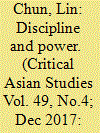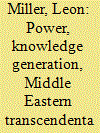| Srl | Item |
| 1 |
ID:
185589


|
|
|
|
|
| Summary/Abstract |
This article argues that in Pakistan, intra-Islamic differences and the contested field of Islamic identity politics affected and moulded the country’s integrated and overlapping religious identities into distinct and disparate categories at the micro level. The article discusses the process of formation of the jamaat of the Sufi-inspired silsila, the Naqshbandia Awaisia, by Major Ghulam Muhammad among the military and an urban middle-class constituency. It shows how the jamaat conceptualised and imbued Sufism with an exclusivist approach, positioning Sufism and Sharia within an Islamic discourse that categorically rejected the religion’s ritual and devotional aspects. This embroiled these mutually constitutive and intersecting dimensions, Sharia, esoteric Sufi doctrine and the devotional and ritual aspects in an ambivalent relationship. The exclusion of the devotional and ritual aspects became a boundary-setting label of difference between the ‘proper’ Muslim and the ‘other’ along a matrix of knowledge and power.
|
|
|
|
|
|
|
|
|
|
|
|
|
|
|
|
| 2 |
ID:
155758


|
|
|
|
|
| Summary/Abstract |
Mainstream political science treats China as an anomaly that has not followed the “right” path of development, that is, a path that confirms the worldview, normative values, knowledge, and expectations of a Euromodern origin. This essay identifies inherent biases in the discipline and shows how the dominant disciplinary approach to Chinese politics has largely remained focused on validating questionable political-scientific tenets. A tentative proposal is offered for intellectual steps toward more openness and efficacy in disciplinary knowledge production and consumption. The argument is not about overcoming Eurocentrism by promoting Chinese exceptionalism. On the contrary, it is political, and challenges the power of current organizing principles of knowledge in search of a more accurate and cogent understanding of Chinese and global politics.
|
|
|
|
|
|
|
|
|
|
|
|
|
|
|
|
| 3 |
ID:
135687


|
|
|
|
|
| Summary/Abstract |
twentieth century scholars have analyzed the middle east from a number of perspectives ranging from geopolitics, security studies, conflict studies, the Palestine-Israel conflict, fundamentalism (The War on Terror), and in connection with oil (Global political Economy). But it has only been recently that a small number of scholars have begun to research the interface between current trends in the Middle East (and North Africa) and corresponding current challenges that Western Civilization is confronted with.
|
|
|
|
|
|
|
|
|
|
|
|
|
|
|
|